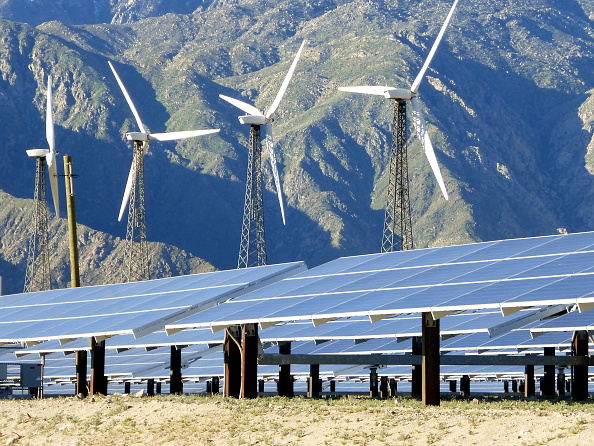In its latest budget plan, the Trump administration was once again “derelict” in proposing cuts to clean energy research, Sen. Maria Cantwell (D-WA), the top Democrat on the Senate Energy and Natural Resources Committee, said Wednesday in a speech at a renewable energy policy forum sponsored by the American Council on Renewable Energy (ACORE).
The United States needs to move away from fossil fuels, but instead the Trump administration is championing the coal industry and trying to eliminate programs that promote new energy technologies, Cantwell said.
With Congress preparing to negotiate a massive fiscal 2018 spending package that will fund all federal agencies, Cantwell pledged to fight to preserve full funding for the Department of Energy’s Office of Energy Efficiency and Renewable Energy (EERE). “The federal government is uniquely there to sponsor basic R&D research, accept the long-term risk and challenges, [and] partner with industry on promising innovation,” she said.
EERE’s mission is to help support the development of clean, renewable, and efficiency energy technologies and support a global clean energy economy. Under the White House budget proposal, the office’s funding would be cut by more than 65 percent, according to Cantwell.
Congressional Republicans, like President Donald Trump, want to hold onto the past, Cantwell said. “The transition is going to happen whether they want it or not,” she added.
Cantwell also blasted Trump’s efforts to appease his political supporters in the coal industry. Last September, Energy Secretary Rick Perry, at the direction of the White House, sent a proposal to the Federal Energy Regulatory Commission (FERC) to bail out the coal and nuclear industries.
“The notion that the administration wanted to pick up … the Bat phone and call the energy secretary and tell him to call FERC and mandate coal was some of the most ridiculous policy I have seen,” she said.
On the campaign trail, Trump promised coal industry executives that he would take various actions to prop up their ailing industry. But in early January, FERC — composed of three Republicans and two Democrats — unanimously rejected Perry’s controversial proposal to create a more “resilient” grid. The commissioners tore into the core of Perry’s argument, namely the idea that somehow cheap renewables and natural gas are forcing essential coal and nuclear plants to be shut down.
At the policy forum, ACORE president and CEO Greg Wetstone emphasized that the renewables sector showed impressive strength — or “resilience” — in 2017 in the face of fundamental challenges like Perry’s proposal to prop up the coal industry and the Republican tax bill.
In the end, the tax bill passed by Congress preserved critical tax credits for wind energy, solar power, and electric vehicles. And the sector finished 2017 by scoring an impressive $43 billion in investments and bringing online 18 gigawatts of new renewable energy capacity.
Wetstone noted that concerns remain about potential changes to wholesale power markets that restrict participation for storage, wind and solar power, and demand response. “Will there be a truly fuel-neutral market?” he asked. “Or will this exercise become an excuse to subsidize aging power plants that are no longer economically competitive?”
Even though FERC rejected Perry’s pro-coal proposal, the commission asked electric grid operators to address how grid resilience could be improved. Some in the renewables sector are concerned that efforts to address grid resilience could result in higher payments to many of the same generators that would have benefited from the Department of Energy’s proposal — to the exclusion of wind energy and solar power.
Sen. Lisa Murkowski (R-AK), chairwoman of the Senate Energy and Natural Resources Committee, also spoke at the policy forum in Washington D.C., telling the audience that there’s no question federal policymakers and regulators need to increase their focus on renewable energy.
Murkowski, who took a neutral stance on Perry’s efforts to subsidize the coal and nuclear industries, emphasized the nation’s electric grid is no longer just a delivery system for large centralized generation assets like coal and nuclear plants.
Murkowski said one of the issues that drives her focus on renewables is the “threat” and “reality” she sees from climate change in her home state of Alaska. In the Bering Strait, for the first time in memory, there is no ice around an island located in the area between Alaska and Russia. “It is historic in a way that is certainly getting our attention,” she said.
“We know we need to reduce our greenhouse gas emissions and to do that, we need to commercialize new technologies, modernize our electric grids, and upgrade our energy infrastructure,” Murkowski explained.
But as a supporter of the fossil fuel industry, including drilling in the Arctic National Wildlife Refuge, Murkowski added that “for the foreseeable future hydrocarbons are crucial as well.”


